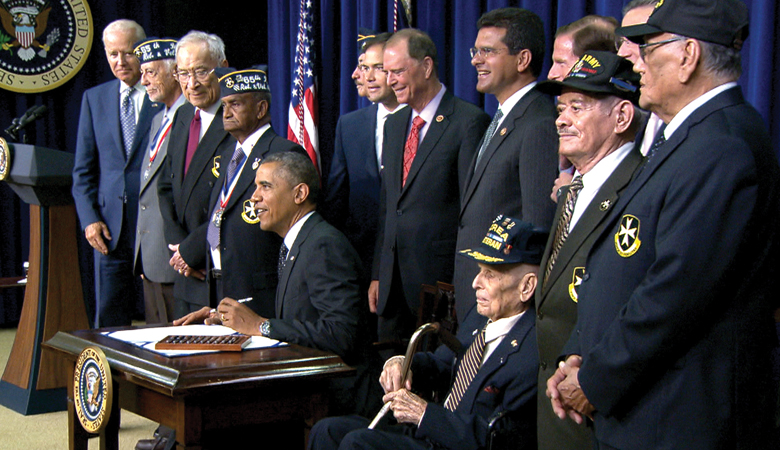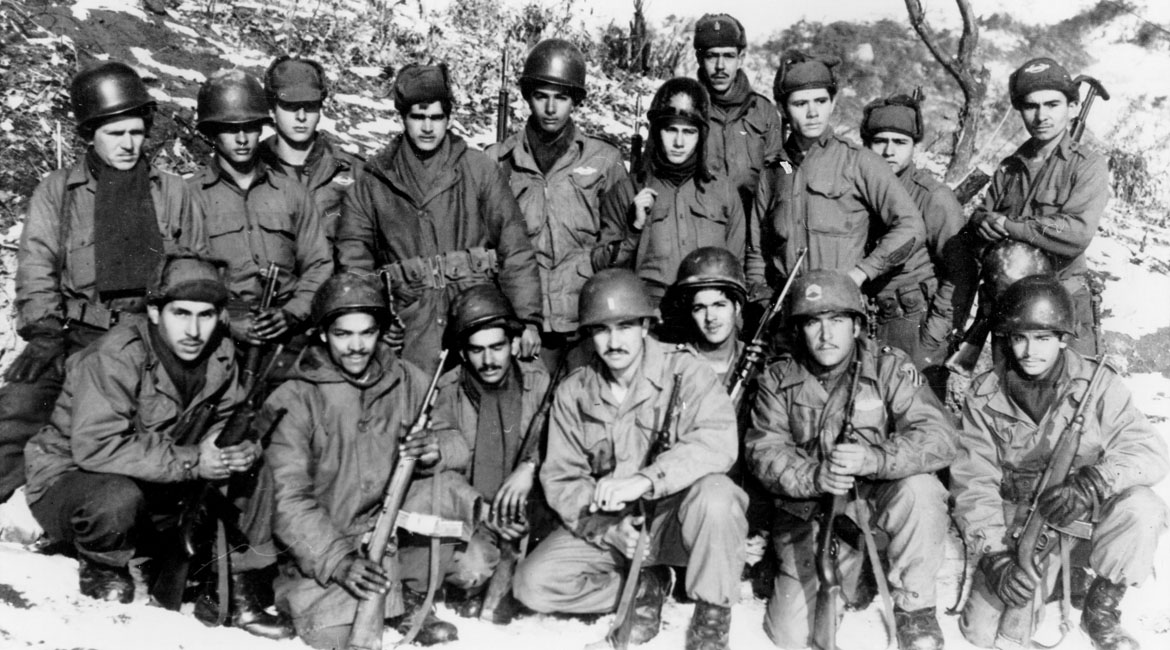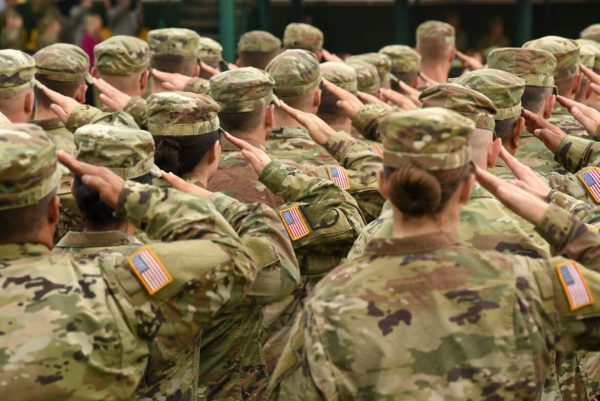The all-Latino unit from Puerto Rico distinguished itself during the Korean War.
Above: Han River, South Korea – Members of the Puerto Rican infantry unit who distinguished themselves during heroic combat during the Korean War. Photo By: 65th Infantry Regiment.
As part of our Veterans Way series, I have written about heroic individuals through many conflicts and units, such as World War I’s Harlem Hell Fighters, who were the first African-Americans to fight and suffered the highest casualty rate of any American unit in The Great War. I also penned an article about the 442 Regimental Combat team of Japanese-Americans, the most decorated army unit in World War II. We now add a third, the U.S. Army’s 65th Regiment, the only all-Latino unit from Puerto Rico who fought during the Korean War. All three of these highly decorated regiments suffered the scorn and pain of bigotry. Their common denominator was a desire to prove their loyalty and willingness to fight for our country.
The 65th did serve with distinction during WWII, its soldiers earning a Distinguished Service Cross, two Silver Stars, and 900 Purple Hearts for combat in Europe. But their impressive maneuvers in an Atlantic Fleet joint training exercise for the Army, Navy, Marines, and Air Force, back home in Puerto Rico after the war, garnered the attention of Army leaders to believe that the 65th was combat ready.
In August 1950, the Korean War was less than two months old, and Puerto Rico’s 65th Infantry Regiment was on its way to the combat zone. The regiment landed at the port city of Pusan[CM1] on the Korean Peninsula’s southern tip, where United States forces had been holding a perimeter against the Communist North Korean invaders. The 65th Infantry Regiment nicknamed their regiment “The Borinqueneers” after landing in Korea. The name comes from the original Taíno Indian name for Puerto Rico (Borinquen).
Sent into action immediately, the Puerto Ricans took part in the United States breakout and drove to the north. Following the brilliantly planned and executed surprise landings at Inchon, the U.S. and other United Nations forces drove deep into the mountains of North Korea. At that point, a huge Chinese army entered the war.
The United States Eighth Army was overrun, and the 1st Marine Division, with attached United States and British Army units, was completely encircled. In one of the greatest fighting retreats in history, the outnumbered Marines battled their way south to the coast. The first friendly troops they saw on the frozen ridgetops were the Puerto Ricans of the 65th Infantry Regiment, sent to hold the perimeter around the vital port of Hungnam.
The Puerto Ricans supervised the evacuation of Hungnam, finally sailing themselves on Christmas Eve, 1950. The defense of that perimeter enabled the Marines, plus the allied forces, to be evacuated. Supported by Naval gunfire, as well as Navy and Marine air teams, it was those soldiers manning those hilltops that helped make the evacuation possible.
In January 1951, the 65th landed in Pusan as they had five months before, and again fought their way northward. They found themselves south of the Korean capital of Seoul, under orders to take two hills held by the Chinese 149th Division. The assault began on January 31 and took three days. On the morning of the third day, the top of the hills was within reach, and two battalions of the 65th fixed bayonets and charged straight at the enemy positions.
The Chinese fled. During its service in Korea, the men of the 65th Infantry won four Distinguished Service Crosses and 125 Silver Stars. The Borinqueneers were also awarded the Presidential and Meritorious Unit Commendations, two Korean Presidential Unit Citations, and the Greek Gold Medal for Bravery. The 65th Infantry Regiment’s gallant service in a difficult war is exemplified by its regimental motto, “Honor and Fidelity,” and the regiment itself exemplifies the National Guard’s leading role in our nation’s military history.
Before he was relieved of command by President Truman on April 11, 1951, General Douglas MacArthur, who had commanded the U.S.-led United Nations forces from June 25, 1950, stated that the soldiers of the 65th showed “magnificent ability and courage in field operations. They are a credit to Puerto Rico, and I am proud to have them in my command.”
In the fall of 1952, the unit’s fortunes changed. Chinese troops launched major offensives against two U.S.-held outposts defended, in part, by the 65th: Outpost Kelly in September and Jackson Heights a month later. The Borinqueneers suffered heavy casualties. Troop morale sank and despair permeated the ranks. After the carnage at Outpost Kelly, unit commanders cut the Puerto Ricans’ rice and beans rations, stripped the Borinqueneers nickname off their vehicles. They also ordered the men to shave their mustaches until they could prove they were “real men” in battle.
Deeply insulted and facing what most thought was a suicide mission, dozens of soldiers refused orders to retake the Jackson Heights outpost. The Army quickly court-martialed and convicted 91 of them for desertion and disobeying orders in December. All were dishonorably discharged. Sentences ranged from one to 16 years of confinement at hard labor. After intense public pressure, the Army quickly pardoned them, later blaming incompetent Army leadership, poor military tactics, racism, and organizational prejudice for the events that landed the soldiers in the brig. The findings of an internal Army investigation provided some vindication for the soldiers, their families, and for Puerto Rico’s pride. But many died waiting for the broader exoneration that would truly clear their names in the history books.

Above: President Obama awards a Congressional Gold Medal to the “Borinqueneers,” a Puerto Rican regiment of the United States Army.
“It’s a proud day for all those whose lives they saved and whose freedom they defended,” said President Barack Obama at the 2014 White House ceremony awarding the once-vilified regiment the Congressional Gold Medal, the nation’s top honor. “You’ve earned a hallowed place in our history.” Those words from the president, and that redemption from the top, took more than 60 years.
“They treated us…like we were worth nothing,” Raúl Reyes Castañeira, the youngest of four brothers who followed their his father’s footsteps into the 65th Infantry, told Univision’s Aquí y Ahora news magazine. “And we were giving our lives. So many young men there just dying. It was terrible.”
Army officials told Congress that the rotation of new, inexperienced soldiers and officers into the regiment—and their inability to speak English—led to the failures and court-martials. Secretary of the Army Robert Stevens used the point about the language barrier to justify pardoning all those convicted, overturning their sentences, and reinstating them in the Army.
A subsequent internal investigation listed many other problems, including inept leadership, a severe ammunition shortage, and military tactics that needlessly increased casualties. The 65th suffered 806 casualties in just those two months defending and attempting to retake the strategically questionable Kelly and Jackson Heights outposts.
The investigation also blamed “a command environment guilty of ethnic and organizational prejudice,” both on and off the battlefield. Investigators pointed out that the commanders who had court-martialed the Puerto Rican soldiers had on other occasions opted not to prosecute white soldiers for abandoning the battlefield. Rather than use the moment to reform the 65th or fix certain practices, commanders chose to punish the battalion. The probe also highlighted a double standard in how commanders treated and evaluated Puerto Rican officers and white officers and other instances of ethnic or racial prejudice in the Army’s command structure.
For cultural historian Silvia Alvarez Curbelo, a professor of communications at the University of Puerto Rico, the court-martials that tarnished the 65th’s reputation were not seen on the island as isolated cases of discrimination. Rather, they posed an affront to Puerto Rican identity as U.S. citizens at a time when the island was ascendant, having elected its first governor four years earlier, had just ratified its constitution that year, and was close to ending a five-year wave of mass migration to the continental United States.
Norberto Rivera, a Borinqueneer who survived the Kelly Outpost bloodbath, told Aquí y Ahora (which translates to “Here and Now”) that he welcomes the Congressional Medal of Honor as a salve to those days he remembers with much nostalgia and pain. “I think the credit, the recognition, should go to those men who never made it back home,” Rivera said.
Their sacrifices in World War II were no less than those made in Korea during the Battle of the Bulge. PFC Luis Castro, from Orocovis, Puerto Rico, was assigned to the 47th Infantry when the German Army broke through his platoon’s front line. Castro was alone on his platoon’s flank when he noticed two platoons of enemy soldiers moving towards his position. Even though he was short on ammunition, he held out against the two platoons with his rifle and grenades. Castro’s actions forced the enemy to retreat, leaving 15 dead and wounded German soldiers behind. For his actions, he was awarded the Distinguished Service Cross by the commanding general of the Fifth Army.
I am ending this piece with a paragraph from the National Museum of the US Army: “The sacrifice of Castro and the bravery of others are brief glimpses into the nature of Puerto Rican service in World War II. Their stories paint a picture of honorable and dedicated service to the United States Army by Puerto Rican men and women. Their willingness to serve alongside white, black, and Japanese-American soldiers should have marked a drastic turning point for the acceptance of Puerto Rican people and culture in the United States. Sadly, however, this was not always the case.”
_________________________
To become a subscriber, visit www.thecannatareport.com/register or contact cjcannata@cannatareport.com directly. Bulk subscription rates are also available upon request and included in our media kit.




